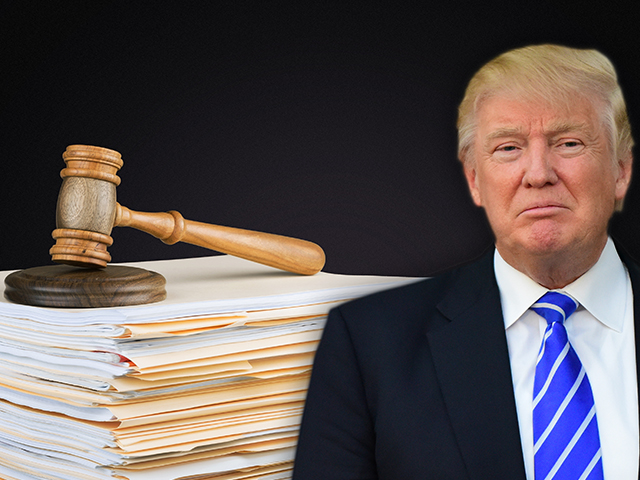 Another day, another uproar about something Trump said. The presidenial self-incrimination machine keeps a-rolling. This time, critics charge, President Donald Trump admitted to tampering with or intimidating a witness.
Another day, another uproar about something Trump said. The presidenial self-incrimination machine keeps a-rolling. This time, critics charge, President Donald Trump admitted to tampering with or intimidating a witness.
Fox News‘ Ainsley Earhardt prompted the president, asking whether the initial suggestion that tapes of discussions between Trump and James Comey had maybe kept the former FBI director “honest” during his Congressional testimony. Trump replied:
“Well, it wasn’t very stupid, I can tell you that. He did admit that what I said was right, and if you look further back before he heard about that I think maybe he wasn’t admitting that.”
Yeah, okay. This is the devious brilliance of our Queens-born robber baron-cum-gameshow host-cum-president. Donald Trump is smart enough to outfox James Comey, but the president let his guard down because he was intimidated by Earhardt’s voluble journalistic acumen.
Suggesting that Trump’s putative ploy–if you’re willing to credit the president with that level of cleverness–to make Comey act honest may be read as some sort of influence being brought to bear on some sort of witness of something, sure.
In one context, all the street lamps on Broadway bear witness to the people coming down the subway stairs after they exit the J Train, but that’s obviousy different. Beyond the context of law there’s no “witness” to “tamper” with.
The charge of “witness tampering” or “witness intimidation” in at least a quasi-legalistic context is the only way such concepts have any relevance here. Suggesting Trump is guilty of actual, illegal witness tampering conflates various contexts and definitions of “witness”. And the only context that matters is the law.
The law on point is 18 USC § 1512(b), which states, in relevant part:
Whoever knowingly uses intimidation, threatens, or corruptly persuades another person, or attempts to do so, or engages in misleading conduct toward another person, with intent to—
(1) influence, delay, or prevent the testimony of any person in an official proceeding;
(2) cause or induce any person to—
(A) withhold testimony, or withhold a record, document, or other object, from an official proceeding;
(B) alter, destroy, mutilate, or conceal an object with intent to impair the object’s integrity or availability for use in an official proceeding;
(C) evade legal process summoning that person to appear as a witness, or to produce a record, document, or other object, in an official proceeding; or
(D) be absent from an official proceeding to which such person has been summoned by legal process; or
(3) hinder, delay, or prevent the communication to a law enforcement officer or judge of the United States of information relating to the commission or possible commission of a Federal offense or a violation of conditions of probation [1] supervised release,,[1] parole, or release pending judicial proceedings;
shall be fined under this title or imprisoned not more than 20 years, or both.
That statute does offer some room to ply their mostly fallow imaginations, but it’s an extremely ill-advised stretch–at the time Trump sent the original “tapes” tweet, there weren’t any proceedings to speak of. (Comey didn’t agree to testify until after Trump’s tweet.)
However, allowing that there’s something to critics’ charges, for the sake of argument, still doesn’t do it. Here’s subpart (e) of that same statute:
In a prosecution for an offense under this section, it is an affirmative defense, as to which the defendant has the burden of proof by a preponderance of the evidence, that the conduct consisted solely of lawful conduct and that the defendant’s sole intention was to encourage, induce, or cause the other person to testify truthfully.
If Trump’s aim–and effect–was to get Comey to tell the truth, then this entire fracas remains the psuedo-academic posturing it began as.
Of course, most people are clinging to fantasies of High Crimes and Misdemeanors for no reason other than their extreme political powerlessness and inability or unwillingness to build the future by engaging in actual political organizing. I get it. Real political work is hard. It’s much easier–and extremely cathartic–to complain about Trump on the internet.
But let’s be real. Russiagate and its progeny, for all the intrigue and apparent injustice, is a dead-end. An interminable story leading lambs to a slaughter of pure political impotence. Once the whole thing winds down and Trump’s still president, the massive distraction from issues of life or death–like the GOP health care bill–will perhaps come into clarity.
For now, it’s all just political cosplaying at best.
It may seem silly to harp on the concepts of context and legal terms of art in the midst of a scandal that’s shaken liberal faith in American institutions to the bone–but welcome to reality.
The law is a land of vertiginous barriers that are frequently inaccessible even if something feels really wrong. As for the lawyers making these arguments; they don’t need to be reminded things only matter or make sense when discussed in context, they know better, but they also know how to get on TV. In America, a few minutes of fame outweigh strict accuracy, especially for certain lawyers. And in the Trump era, where the fact that nothing really matters to the decaying elites on both sides of the aisle, it makes perfect sense.
[image via screengrab]
Follow Colin Kalmbacher on Twitter: @colinkalmbacher
This is an opinion piece. The views expressed in this article are those of just the author.